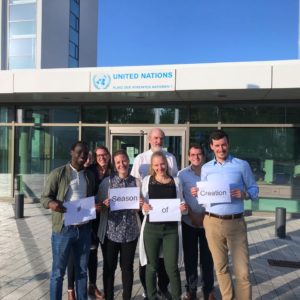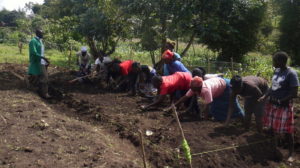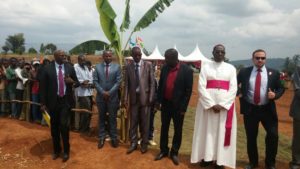Under the title “Advancing climate justice with faith-based renewable energy projects” the World Evangelical Alliance (WEA) will host an official side event at the Fourth United Nations Environment Assembly (UNEA-4) of the United Nations Environment Program (UN Environment). The UNEA is the world’s highest decision-making body for environmental questions. It will take place between March 11 and 15, 2019 in Nairobi, Kenya.

The team of the World Evangelical Alliance Sustainability Center (WEASC) © WEASC
Matthias Boehning, Director of the WEA Sustainability Center, who will be one of the panelists of the side event, underlines:
“We all have a shared responsibility to face the multiple and pressing environmental challenges and to develop sustainable solutions. As a Christian organization, we have a special responsibility to work together with people who are most vulnerable to problems caused by climate change. This requires the close cooperation of actors from all areas of society, both faith-based and secular.”

Jitokeze Biointensive Farming Training © Jitokeze Wamama Wafrika
Together with the Interfaith Center for Sustainable Development (ICSD) from Jerusalem (Israel) and the Kenyan organization Jitokeze Wamama Wafrika from Kapenguria (Kenya), the WEA will address how decentralized renewable energy projects by faith-based actors in rural Africa can be a means to greater empowerment to achieve climate justice for vulnerable groups. The ICSD, which will be represented by its Director Rabbi Yonatan Neril, builds on extensive experience in implementing renewable energy projects with faith-based actors in rural African regions. Working in a rural area in Kenya, Philipine Kidulah, Director of Jitokeze Wamama Wafrika, will share her knowledge on how to empower vulnerable women and their households to be more resilient against the impacts of climate change.

Gigawatt Project Rwanda © Gigawatt Global
With a specific (faith-based) actor set-up, renewable energy projects can function as an innovation in rural areas for sustainable consumption and production of energy. The approach empowers vulnerable groups to become proactive agents of change in climate change mitigation efforts. This takes the discussion on empowerment of vulnerable groups beyond the usual aspect of adaptation. Empowered rural communities are able to implement sound natural resources management. During the side event, this will be illustrated by the practical case of a farmer’s empowerment program in rural Kenya that is moving beyond adaptation into building innovative sustainable business models.

Gigawatt Project Rwanda © Gigawatt Global
Since the end of 2017, the UN Environment Program has been working with the framework of the Faith for Earth Initiative to engage faith-based and religious organizations in the development of global environmental solutions. The goal of the initiative is to strengthen faith-based actors in the field of environment and partner with them at all levels to work together to achieve the Sustainable Development Goals (SDGs). Currently, the Secretariat of the UN Environment Program is preparing an action plan for the special activities of the Faith for Earth Initiative at the Fourth UNEA.

Exterior view of the Bonn WEA representative office © WEA
In 2018, the WEA Sustainability Center (WEASC) was established in the UN City of Bonn. The center addresses sustainability issues from a Christian perspective and empowers followers of Christ to exercise leadership on all levels of sustainability efforts. The overarching objective is to equip churches and congregations around the world to implement Creation Care on a daily basis and thus become a strong, legitimate, and unified voice in global debates on sustainability. Since 2012, the WEA has been working intensively on environmental issues with its Creation Care Task Force. The Task Force is a member of the Lausanne/WEA Creation Care Network, a global network of individuals and churches around the world working together for creation care.

The director of the World Evangelical Alliance Sustainability Center (WEASC), Matthias Boehning © Leonard von Bibra
The WEA is a network of national evangelical church alliances in 129 countries and over a 100 international evangelical organizations and provides a worldwide identity, voice, and platform for more than 600 million evangelical Christians. It has been working with various UN bodies for many years in its efforts to achieve progress in solving global sustainability issues.
For more information on the event please email info@wea-sc.org.